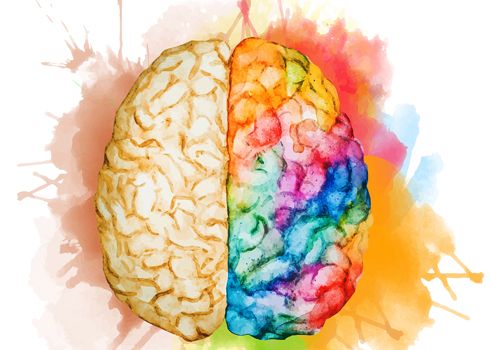Reading time: Less than 3 minutes
Has a piece of writing ever left you stymied? My guess is that you may have overthought it. Here’s why overthinking is bad for writers…
When I teach people about mindmapping, I try to be explicit about one thing. My use of the phrases “left side of the brain” and “right side of the brain,” is entirely metaphorical.
I’ve long known that creativity doesn’t sit only on the right side, as was widely believed in the 1970s. Nor does linear, logical thinking exist only on the left. But I stick with the left vs. right lingo because it’s useful for writers to remember that some parts of the brain are better at writing (creative work) and other parts are more useful for editing (linear, logical work.)
In fact, researchers from Dartmouth College wrote a study about this subject, in 2013. Their conclusion? Creativity and imagination require a widespread neural network in the brain and this space involves all four hemispheres. (That’s two each — a left and a right — for the cerebrum and the cerebellum.)
More detail became known in 2015 when researchers discovered that proprioceptive activities (actions such as tree-climbing that make you aware of your body in space) increase working memory by 50 percent. And it’s working memory that allows creativity to flourish.
So what, exactly, is creativity? It’s the tendency to generate or recognize new and fresh ideas. It allows us to see the world in new ways, find hidden patterns, make connections between seemingly unrelated things and generate solutions.
Creativity is essential for writers — even non-fiction ones — because it’s what allows us to find the most interesting and engaging ways to express information so that other people will want to read it.
The big problem writers face, however, is that our raw material is words. And our form of expression requires grammar and syntax. I was going to say that visual artists have an easier time getting into their creative space because it’s free from language. But I just realized — as someone who’s practically allergic to drawing and painting — that I don’t know that to be true! (If you’re a visual artist, please post a comment about this in the comment box at the end of this post.)
As writers, we usually want to think really hard about our work and we expect that thinking will give us the answer to our writing problems. But what I like to call the “aha moments” occur almost always when our conscious mind is thinking of something else, or not thinking at all.
We can’t generate creative solutions to our writing problems through sheer force of will. Instead, we can only provide a comfortable environment in which they can emerge on their own. This is why overthinking is such a big mistake.
Overthinking occurs when we rely on our prefrontal cortex, found in the cerebrum. It’s a relatively “new” part of our brain in terms of human evolution and it’s the part that gets the biggest workout in school and many aspects of our jobs. It’s responsible for planning, executive function and working memory. (My late father had dementia in his prefrontal cortex and it made him utterly unable to plan anything, even though he could still have reasonably intelligent conversations.)
Now, science is telling us that the prefrontal cortex isn’t so useful to creativity. Instead, the cerebellum may be key to the creative process. Another 2015 study, conducted by Stanford University and published in Scientific Reports, shows direct evidence that the cerebellum — home to muscle memory, balance and coordination — is directly involved in the creative process.
So the next time you’re struggling with a piece of writing, instead of trying to think your way through the problem, take a break and go for a walk or a swim or a bike ride. As philosopher and psychologist William James advised way back in 1911: “When you are making your general [creative] resolutions and deciding on your plans of campaign, keep them out of the details. When once a decision is reached and execution is the order of the day, dismiss absolutely all responsibility and care about the outcome.
“Unclamp, in a word, your intellectual and practical machinery, and let it run free; and the service it will do you will be twice as good.”
Basically, don’t overthink.
This is an updated version of a post that originally appeared on my blog Dec. 8/15.
*
Do you ever fall prey to overthinking? We can all learn from each other so, please, share your thoughts with my readers and me in the “comments” section below. Anyone who comments on today’s post (or any others) by Aug. 31/18 will be put in a draw for a copy of the non-fiction book Selling to Big Companies by Jill Konrath. Please, scroll down to the comments, directly underneath the “related posts” links, below. Note that you don’t have to join the commenting software to post. See here to learn how to post as a guest.


